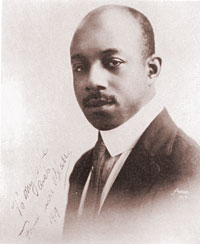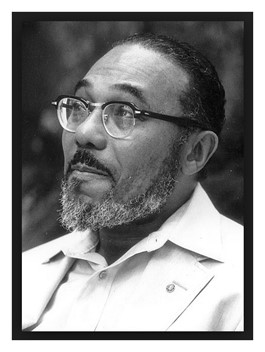
African American Composers (Continued)
Concerning the impact of African American musicians and their music on American music, the distinguished American composer, arranger, pianist, and teacher, Hale Smith, Jr. , states in the forward of Banfield's groundbreaking work Musical Landscapes in Color: Conversations with Black American Composers:
Can you imagine American music without the work of [B]lack composers or without [B]lack music in general? Still, there is a refusal, a denial, of that reality. Through the work that I have done with the Black Repertory Ensemble, I have been able to see the entire panorama of American music as created by us, going back to Francis Johnson (1792-1844) and coming down that long, tortuous road. Without these people, without their contributions, American music would be altogether different. This involves people from Louisiana and people from New York. This includes people like Will Marion Cook (1869-1944) and Eubie Blake (1883-1983).
American music would be radically different without what these people have done. And it is not only those who have dealt with nonpopular forms because, if you include the popular music, Black music is what has given American music its identity. It is just the music itself; whether we can name two, three, a dozen, a hundred or a thousand [B]lack musicians and composers, it is the totality without which American music would be completely different. You can find traces of this stuff in Walter Piston. You can find traces of it in Charles Ives and certainly in Aaron Copland. It pervades American music to such an extent that it can be denied only by people who have blinders on or who cannot hear. The only real impact Chadwick has had on American music is that Chadwick taught William Grant Still (1895-1978). They were skilled, and all that, but they did not bring anything new; their work was just the rehashing of German Romanticism. I am saying that American music would be completely unrecognizable of what we know now without the music of [B]lack composers. Somebody once said that without the music of [B]lack music, American music would be Lawrence Welk (1895-1978).
(Banfield 2003, forward)

Eubie Blake
On March 25, 1988, the Black Music Repertory Ensemble made its concert debut in Chicago at the Emma and Oscar Getz Theater of Columbia College Chicago. The Ensemble, a performing arm of the College's Center for Black Music Research, in residence at the College for the Spring 1988 term, was founded for the purpose of spotlighting and promoting appreciation for the Black musical heritage through the performance and recording of small-ensemble literature written by Black composers between ca. 1800 and the present day.
For Samuel A. Floyd, Jr., (1937-2016) who established the Center in 1983 and serve[d] as its director, the premiere concert of the Ensemble was a "dream become reality in a way that perhaps exceeded [his] initial hopes." First of its kind, the Ensemble is devoted primarily to performing printed music that has been unearthed, newly discovered, or newly composed. More specifically, its program is designed to present rarely heard Black music, to stimulate new research, and to increase performance opportunities for musicians and for the music of living Afro-American composers (Raptosh 1988). In 1988 while a student at Northwestern University, the author of this lesson was contracted by Floyd to teach courses in African American Music at Columbia College in Chicago. I will not forget his guidance in my career.
| Hale Smith's Impact on American Music | ||
|---|---|---|
| Short Bio | Hale Smith Jr. (1925-2009) | |
|
HALE SMITH is regarded as one of America's finest composers. He also had a distinguished career as an arranger, editor, and educator. Born in Cleveland, Ohio on June 29, 1925, he began study of the piano at age seven, and his initial performance experience included both classical and jazz music. After military service (1943-45), he entered the Cleveland Institute of Music as a composition major, receiving a bachelor's degree in 1950 and a master's degree in 1952. His principal teachers were Ward Lewis in theory, and Marcel Dick , his only teacher of composition.
He moved to New York in 1958 and from that time he worked with many prominent jazz artists, including Chico Hamilton, Dizzy Gillespie, Eric Dolphy, Randy Weston, Melba Liston, Ahmad Jamal, and Oliver Nelson. He also served as an editor and consultant with several music publishers (E.B. Marks, C.F. Peters, Frank Music Corp. and Sam Fox Music Publishers). |
 Hale Smith |
|
|
In 1952, Smith was a winner of the first Student Composer's Award sponsored by Broadcast Music Inc., and in 1960 was commissioned by BMI to compose Contours for Orchestra . His other works include Ritual and Incantation , Innerflexions , By Yearning and By Beautiful, Music for Harp and Orchestra, Orchestral Set, Mediations in Passage, several chamber music and solo pieces and several works for chorus and solo voice and piano.
Smith received several honors including the Cleveland Arts Prize, and Awards from the American Academy and Institute of Arts and Letters, The National Black Music Caucus, and an honorary doctorate from the Cleveland Institute of Music.
He taught at C.W. Post College (Long Island) and was Professor Emeritus from the University of Connecticut. In addition, he served on the boards of several organizations including The American Composers Alliance, Composer's Recordings, Inc., The American Music Center, and several state arts councils. He also was a copyright infringement consultant, and orchestrator and artistic consultant for the Black Music Repertory Ensemble of the Center for Black Music Research Columbia College Chicago. Smith was appointed to the New York State Council on the Arts (1993-1997) by Governor Mario Cuomo (Duffie 1987). |
||





